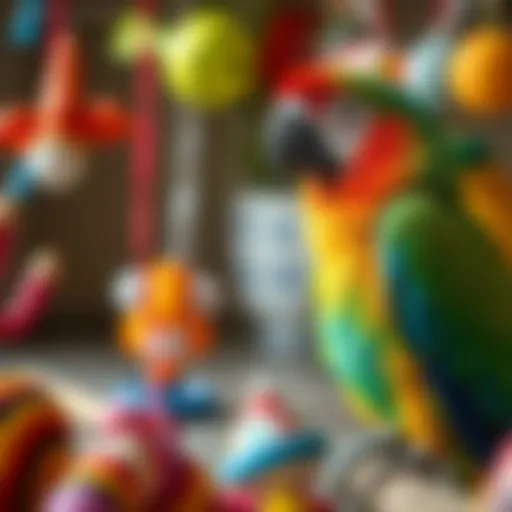Understanding Rabbit Dental Health: Care and Insights
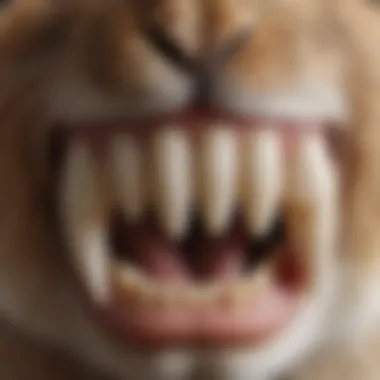

Intro
Dental health in rabbits is often overlooked by pet owners. This topic is not just about aesthetics; it significantly impacts their overall well-being. Understanding the unique dental structure of rabbits is the first step in identifying potential issues. Given that their teeth continually grow, proper dental care requires attention and proactive measures.
By exploring the intricacies of rabbit dental health, pet owners can be equipped with knowledge that is crucial for ensuring a long, healthy life for their pets. Keeping in mind the importance of preventive care, this article will guide rabbit owners through the various aspects of maintaining optimal dental hygiene.
Understanding Your Pet
Pet Behavior Basics
Rabbit behavior may seem simple at first glance, but it involves various cues that indicate their health and emotional state. Observing how they eat, groom, and interact with their environment provides valuable information. A rabbit’s eating habits are particularly telling regarding dental health. Chewing is essential; it helps keep their teeth worn down naturally.
Common Breed Characteristics
Different rabbit breeds exhibit varying traits that can affect their dental health. For instance, larger breeds may have more considerable dental challenges due to the size of their jaws and teeth. Therefore, understanding your specific breed can aid in recognizing potential health issues early.
Species-Specific Needs
Rabbits are herbivores that require a unique diet. Their teeth are designed to grind down fibrous materials found in hay, vegetables, and pellets. A proper diet not only supports dental health but also ensures the well-being of the entire gastrointestinal system.
Pet Care and Maintenance
Feeding Guidelines
When it comes to feeding rabbits, focus on high-fiber hay, fresh vegetables, and limited pellets. Good options include Timothy hay, romaine lettuce, and carrots in moderation. These elements help wear down their teeth properly and prevent overgrowth.
Grooming Essentials
Grooming plays a crucial role in your rabbit's health. Regular brushing removes excess fur and reduces the risk of ingesting hair. Additionally, check their mouths occasionally for any signs of dental issues, such as overgrown teeth or sores.
Hygiene Practices
Maintaining hygiene is fundamental for preventing dental diseases. Regularly clean their living area, ensuring that food and waste do not accumulate. This practice reduces the chance of bacterial infections that could affect both dental and overall health.
Health and Wellness
Routine Vet Check-ups
Regular veterinary check-ups are essential for early detection of dental problems. Vet professionals can perform dental exams to identify issues such as spurs or other abnormalities. Scheduling routine check-ups at least once a year is advisable.
Vaccination Needs
While vaccinations are more common with other pets, rabbits also need specific vaccines. Consult your veterinarian about necessary vaccinations, such as those protecting against viral hemorrhagic disease. A healthy rabbit is less likely to face complications from dental problems.
Recognizing Signs of Illness
It is vital to know the signs that indicate dental issues. Common symptoms include changes in eating habits, excessive drooling, or reluctance to chew firmer foods. If any of these signs are observed, consult a veterinarian promptly.
Enrichment and Activities
Indoor vs.
Outdoor Activities
Providing your rabbit with both indoor and outdoor activities is beneficial for their mental and physical health. Indoor play spaces can be enriched with tunnels, ramps, and secure chew toys. Outdoor activities should be supervised to prevent potential dangers.
Interactive Toys and Games
Interactive toys help stimulate a rabbit’s mind and can encourage chewing, promoting dental health. Devices that dispense treats encourage problem-solving and keep them engaged. Chewing on safe wooden toys can further aid in dental upkeep.
Socialization Opportunities
Rabbits are social creatures. Introducing them to other rabbits, or even gentle interactions with humans, can reduce stress and anxiety. A happy rabbit generally exhibits better health, contributing to overall dental well-being.
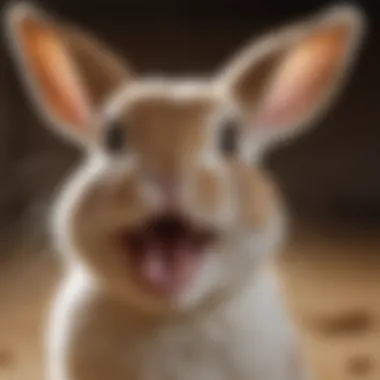

Conclusion: Proper dental care for rabbits is not just important; it is essential. By understanding their needs and behaviors, pet owners will be better equipped to ensure a healthy, happy life for their rabbits.
Overview of Rabbit Dental Anatomy
Rabbit dental health is an important aspect that directly influences the overall well-being of these animals. Understanding the dental anatomy of rabbits helps owners recognize potential issues before they escalate. Rabbits have continuously growing teeth that require constant wear from the right kind of diet. If not managed properly, dental problems can lead to severe health complications.
Unique Features of Rabbit Teeth
Rabbits possess a unique dental structure that is unlike many other animals. Their dental formula consists of incisors, premolars, and molars, with most notable are the four large incisors at the front of their mouths. These incisors grow continuously throughout their life, usually requiring a high-fiber diet to keep them worn down.
The dental enamel of rabbit teeth is extremely hard, accommodating for their natural behavior of gnawing. This chewing action is vital for their dental health. The shape and alignment of these teeth are essential as well. A misalignment can result in malocclusion, an issue that needs to be addressed for the general health of the rabbit.
The Role of Incisors and Molars
Incisors and molars serve distinct but equally important functions in the dental health of rabbits. The incisors are primarily responsible for cutting and nibbling food. Their unique placement allows for efficient foraging, often the first step in the digestive process. On the other hand, molars are designed for grinding, permitting rabbits to break down fibrous plant material effectively.
The interaction between these two types of teeth is critical. A balanced diet consisting of hay, fresh vegetables, and a limited amount of pellets promotes proper tooth wear. If the incisors do not wear down properly, it can lead to elongated teeth that may cause pain and discomfort.
Proper dental health in rabbits hinges on understanding their unique teeth and the role those teeth play in their overall well-being.
In summary, being aware of the anatomical structure and functioning of a rabbit's teeth is essential. Owners must prioritize dental health by providing appropriate dietary choices and monitoring their rabbit's oral condition periodically.
Importance of Dental Health in Rabbits
Dental health in rabbits is not just a matter of aesthetics; it plays a vital role in their overall well-being. Rabbits have unique dental anatomy, and their teeth grow continuously throughout their lives. This characteristic means that neglecting dental care can lead to serious health issues. Proper dental care helps prevent a variety of dental diseases, which, if left untreated, can severely impact a rabbit's quality of life.
Regular dental issues can cause pain, making it difficult for the animal to eat. Surgical interventions can become necessary, which brings risks and complications. Ensuring ideal dental health reduces the chance of these interventions significantly. Therefore, the importance of maintaining dental health extends beyond avoiding immediate problems.
Additionally, strong dental health has a direct link to a rabbit's nutritional intake. Rabbits need to chew fibrous food in order to wear down their teeth naturally. A poor dental condition can hinder this process, leading to digestive problems and other health risks.
Understanding the specific needs of a rabbit’s dental care not only protects the animal but also contributes to a loving and fulfilling relationship between pet and owner.
Impacts on Overall Health
Dental health has profound impacts on a rabbit's overall health. When dental issues arise, the consequences can spread to multiple systems within the body. Infections that develop in the teeth or gums can lead to systemic health problems. For example, bacteria from an abscess may enter the bloodstream and affect vital organs, including the heart and kidneys.
Besides physical health impacts, the pain associated with dental problems alters behavior. A rabbit may become less active or withdraw from socialization. This change can lead to emotional stress as well. Furthermore, an inability to eat properly may lead to significant weight loss and related issues, resulting in a cycle of deteriorating health.
It is crucial to treat dental problems early to mitigate these effects. Regular check-ups and monitoring help catch issues before they escalate, ensuring minimal impact on the rabbit’s health.
Behavioral Indicators of Dental Problems
Behavior is often the first signal of underlying dental issues in rabbits. Observing changes in behavior can reveal discomfort or pain before physical symptoms become apparent.
Changes in Eating Patterns
Rabbits may start to eat less, only chew on specific items, or avoid certain textures altogether. Monitoring eating habits is essential. A decrease in food intake may point to dental pain, leading them to avoid foods that are difficult to chew.
Withdrawal or Aggression
A rabbit exhibiting withdrawal from social interaction or becoming aggressive can indicate dental discomfort. They might express irritation toward handling or when food is presented. These behavioral changes should not be overlooked.
Pay attention to behavior changes; they are key indicators of a rabbit's well-being.
Other signs to watch out for include excessive drooling and a tendency to rub their face against objects. These could mean that they are experiencing dental pain.
Culmination
Recognizing the importance of dental health in rabbits helps guardians provide better care. By being vigilant about their pet’s behavior and eating habits, owners can proactively manage potential dental issues and ensure their rabbits remain healthy and happy.
Common Dental Issues in Rabbits
Maintaining proper dental health is crucial for rabbits. Their teeth continue to grow throughout their lives. This constant growth requires a specific diet to ensure proper teeth wear. Failing to address dental issues can lead to severe health problems. Understanding common dental problems helps pet owners provide better care for their furry companions. In this section, we will explore three prevalent dental issues that affect rabbits. These include malocclusion, dental abscesses, and periodontal disease. Awareness of these conditions can aid in early detection and intervention, ensuring comprehensive rabbit care.
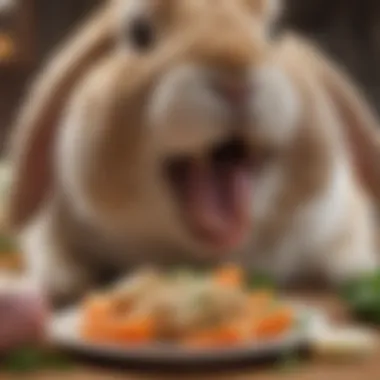

Malocclusion and Its Consequences
Malocclusion occurs when a rabbit’s teeth do not align properly. This misalignment prevents the teeth from wearing down naturally. As a result, excess grinding can occur, leading to significant discomfort and pain. Owners may observe changes in the rabbit's eating habits. A rabbit with malocclusion may avoid hard foods or exhibit difficulty in chewing.
Long-term malocclusion can lead to dental overgrowth. This condition increases the risk of injuries in the mouth, such as sore spots or cuts. Additionally, overgrown teeth can cause deformed jaw structures. It is essential to seek veterinary advice if malocclusion is suspected. Regular check-ups can help identify misalignments before they become serious.
Dental Abscesses
A dental abscess in rabbits is a localized infection, often around the roots of a tooth. Abscess formation occurs when bacteria infiltrate the tissue surrounding the teeth. This condition may arise from periodontal disease or tooth fractures. Symptoms of a dental abscess include swelling in the face, increased salivation, and reluctance to eat.
Dental abscesses not only cause discomfort but can also lead to systemic issues. If the infection spreads, it may impact the rabbit's overall health. Treatment usually involves veterinary intervention to drain the abscess and possibly extract affected teeth. Timely treatment is vital to prevent complications.
Periodontal Disease in Rabbits
Periodontal disease refers to the inflammation of the tissue surrounding a rabbit’s teeth. This condition is often caused by plaque buildup, leading to gingivitis. Signs of periodontal disease include bad breath, red gums, and pockets of infection around the teeth. If untreated, it can result in tooth loss and more serious health issues.
To prevent periodontal disease, owners should maintain a rigorous dental care routine. Regularly providing high-fiber hay can assist in controlling plaque. Additionally, routine veterinary dental check-ups can spot early signs of periodontal disease. Effective management of this condition ensures better health outcomes for rabbits.
Proper dental hygiene plays a significant role in prolonging a rabbit's life and enhancing its quality of life. Routine check-ups and a proper diet can prevent many dental issues.
Preventive Dental Care for Rabbits
Preventive dental care plays an essential role in maintaining the health of rabbits. Rabbits have continuously growing teeth that require ample wear to prevent dental issues. Preventive measures help in reducing the risk of common dental problems and ensure the overall well-being of these pets. By proactively addressing dental health, owners can save time, money, and emotional distress that typically accompany urgent dental treatments.
Role of Diet in Dental Health
Diet form an integral part of their dental health. A proper diet encourages the natural grinding and wearing of teeth. Two key dietary elements are high-fiber hay and fresh vegetables. These not only provide necessary nutrients but also serve specific roles in the maintenance of dental hygiene.
High-Fiber Hay for Grinding
High-fiber hay, such as Timothy or Orchard grass, is crucial for a rabbit's dental health. Its coarse texture helps in wearing down the molars and incisor teeth that are constantly growing. The primary characteristic of this type of hay is its essential fiber content, which rabbits need for their digestive health as well. Feeding high-fiber hay is a beneficial choice for preventing dental problems. By promoting natural chewing and grinding motion, it reduces the risk of malocclusion and other dental issues.
It is important to offer fresh hay daily. However, if the hay becomes stale, its effectiveness decreases significantly. Thus, ensuring the hay is of good quality is vital. In contrast, if hay is not provided sufficiently, it can lead to significant dental pain and associated health concerns.
Vegetables and Their Impact
Fresh vegetables also contribute to dental health. Leafy greens such as romaine lettuce, kale, and parsley provide not just hydration but also help in keeping teeth clean. Vegetables are rich in vitamins and minerals necessary for rabbits but should be offered in moderation. Carrots, despite being high in sugar, can be given occasionally as an enrichment treat.
The unique feature of vegetables is their variety. Each type of vegetable carries different benefits, encouraging dietary diversity. This can help in preventing boredom and promoting healthy eating habits. However, not all vegetables are suitable for rabbits, so awareness of what is safe is crucial.
Routine Dental Checkups with Vets
Regular dental checkups with a qualified veterinarian are necessary for rabbits. These visits allow for professional assessments that can identify potential dental issues early. Vets often have necessary tools to inspect and treat dental problems that might not be immediately apparent at home. Routine checkups foster a proactive approach, ensuring better chances of preventing serious dental complications down the line.
Regular dental care can prevent issues before they become serious. Always consult your vet for recommendations regarding your rabbit's individual needs.
Recognizing Signs of Dental Issues
Recognizing signs of dental issues in rabbits is crucial for their overall health. As rabbits often hide pain, subtle changes can signal underlying dental problems. Early detection allows for timely interventions, reducing risks of severe complications that can arise from neglected dental care.
Changes in Eating Habits
Changes in eating habits can be one of the most telling signs of dental issues in rabbits. If a rabbit suddenly refuses to eat or shows reluctance, it may indicate discomfort caused by dental pain. Common eating habit changes include:
- Decreased food intake
- Favoring soft food over hard pellets
- Difficulty holding and chewing food
- Dropping food while eating
Each of these changes merits observation. Owners should note if their rabbit is consuming less, as reduced interest in food can also lead to gastrointestinal stasis if left unchecked. If you observe such behavior, consult a veterinarian for assessment. They may perform an oral examination to identify potential issues, such as overgrown teeth or misalignments.
Behavioral Changes and Dental Pain
Behavioral changes are another significant indicator of dental pain in rabbits. These changes can be quite varied, yet they often connect back to the discomfort caused by dental issues. Common behavioral indicators include:
- Increased aggression or irritability
- Withdrawal from social interactions
- Reluctance to groom themselves
- Changes in activity levels, becoming more lethargic
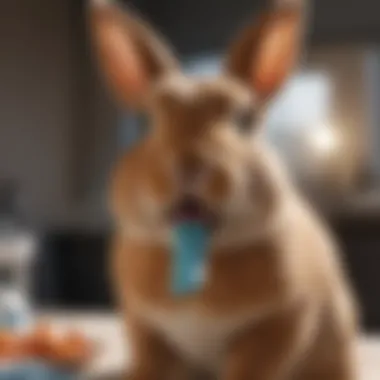

Additionally, rabbits may exhibit signs of stress. Stress can manifest as excessive grinding of teeth or pacing. An important point to note is that these behaviors often exist alongside other dental concerns. Recognizing these patterns is vital for timely intervention.
Timely detection and treatment can immensely impact a rabbit's quality of life.
Maintaining an awareness of eating habits and behavioral changes empowers rabbit owners to ensure their pets remain healthy and content. If any of these signs present themselves, it is advisable to seek veterinary care without delay. With proper attention, many dental issues can be managed effectively.
Treatment Options for Dental Problems
Proper dental health is vital for rabbits, as many dental problems can lead to serious health issues. Understanding the available treatment options for dental problems is essential for rabbit owners. These interventions can keep your pet healthy and comfortable. A well-informed approach can effectively manage or prevent severe dental problems, fostering an environment where rabbits can thrive both physically and mentally.
Surgical Interventions
Surgical options are sometimes necessary when dental conditions are severe. If a rabbit has malocclusion or other severe misalignments, surgical interventions might include tooth extraction or reshaping teeth. These procedures require anesthesia and post-operative care, underscoring the necessity of choosing a qualified veterinarian.
Key Considerations for Surgical Interventions
- Veterinarian Expertise: Proper assessment by a vet is crucial. They must evaluate the extent of the problem before determining if surgery is needed.
- Diagnostic Imaging: X-rays may be required to check if tooth roots are affected.
- Recovery Process: After surgery, rabbits need careful monitoring. They may require pain management and changes in diet for easier eating.
- Long-Term Impact: Consider how surgery may affect the rabbit's overall dental health in the long term. Regular follow-ups will be necessary to monitor any changes.
Surgical intervention can be a delicate balance between immediate needs and long-term health.
Non-Surgical Treatments
Many dental issues in rabbits can be managed without surgery. Non-surgical treatments often include various methods of dental care and management practices.
Types of Non-Surgical Treatments
- Dental Chews and Toys: Providing chew toys helps wear down teeth naturally, promoting ideal dental might. Chewing mimics the natural grinding action of the teeth and helps avoid excessive overgrowth.
- Diet Adjustments: A high-fiber diet, featuring an abundance of hay, can aid in preventing dental issues. Foods with crunchy textures can also promote tooth wear.
- Routine Dental Checkups: Regular visits to the veterinarian are essential for monitoring dental health. Your vet can provide advice on further preventive measures that suit your rabbit's specific needs.
- Home Care Practices: Directly inspecting your rabbit's teeth can help catch problems early. Looking for signs such as overgrown teeth or changes in chewing habits can guide you on what to report to your vet.
Regular check-ups and dietary adjustments can significantly reduce the necessity for surgical interventions, preserving the overall quality of life for your rabbit.
Effective dental management in rabbits combines both surgical and non-surgical options. Each case is unique, requiring attention to the rabbit's specific needs and health history. Pet owners should remain vigilant and proactive in maintaining their rabbits’ dental health.
At-Home Dental Care Techniques
Maintaining dental health for rabbits is not solely the responsibility of veterinarians. At-home dental care techniques are essential for rabbit owners. These practices not only prevent dental issues but also allow owners to closely monitor the dental hygiene of their pets. By investing time in at-home care, pet owners can promote their rabbit's overall health and well-being.
Dental Chews and Their Benefits
Dental chews are designed to help rabbits maintain their dental health. They promote natural chewing behavior, which is necessary for proper tooth wear. Chewing on appropriate materials helps with:
- Reduction of plaque and tartar: Chewing can mechanically remove some of the buildup around teeth.
- Prevention of malocclusion: Regular use of dental chews can help keep teeth aligned correctly, which reduces the risk of misalignment.
- Promoting dental activity: Engaging with dental chews can satisfy a rabbit’s need to chew and keep them entertained during playtime.
Not all products are suitable for rabbits. Always select dental chews specifically designed for them. Products made of high-fiber hay are especially beneficial. These not only aid in dental health but also contribute to the overall digestive health of the rabbit.
Regular Tooth Checks by Owners
Regular tooth checks by rabbit owners can be crucial for early identification of dental problems. By observing your rabbit’s dental health, you can look for signs of issues before they escalate. Key aspects of effective at-home checkups include:
- Visual Inspection: Look for signs of overgrown teeth, especially the incisors. Ensure molars are not hidden and check gums for redness or swelling.
- Check Eating Habits: Notice if the rabbit avoids certain foods or shows difficulty in chewing. Changes in eating behavior often indicate dental pain.
- Gently Feel for Abnormalities: While grooming, gently feel around the mouth and jaw area. Any unusual bumps may require a vet visit.
Regular checks can help catch dental issues early, preventing severe health complications down the line.
By incorporating these at-home dental care techniques into your routine, you foster a preventive approach that can significantly enhance your rabbit's quality of life.
Finale and Best Practices
Dental health is paramount for the overall welfare of rabbits. This article serves to highlight the critical aspects of maintaining dental hygiene in these pets. Understanding the significance of dental care leads to a healthier, happier rabbit. Pet owners must incorporate dental care into their routine, prioritizing prevention and early detection of issues. This proactive approach can significantly lessen the risks associated with dental diseases.
Developing a Routine for Dental Care
Establishing a consistent dental care routine is vital. Pet owners should start by scheduling regular vet checkups. Many veterinary clinics offer dental checks as part of their regular health evaluations. Performing at-home checks can also be beneficial. During these checks, look for signs of teeth wear, gum health, and any behavioral changes the rabbit may exhibit around feeding.
Incorporating dental specific products can enhance this routine. Consider using rabbit-safe dental chews or toys designed to promote chewing and grinding. High-fiber hay is another essential component of a rabbit's diet, as it aids in keeping teeth naturally trimmed and healthy. Routine monitoring alongside these dietary measures creates a comprehensive approach to dental health.
Fostering Awareness About Rabbit Dental Health
Increasing awareness about rabbit dental health is crucial among pet owners and enthusiasts. Many are unaware of the specific dental needs of rabbits. Engaging with online communities can spread knowledge. Forums on platforms like Reddit and Facebook offer spaces to share experiences and findings. Additionally, distributing informative materials can enhance understanding among the general public.
Veterinary schools and local animal shelters can play a key role. They can conduct workshops or webinars aimed at educating pet owners. Promoting discussions about the importance of dental health will foster a more enlightened community. As a result, more rabbits will receive the proper care and attention they need regarding their dental health, ultimately leading to improved life quality.





